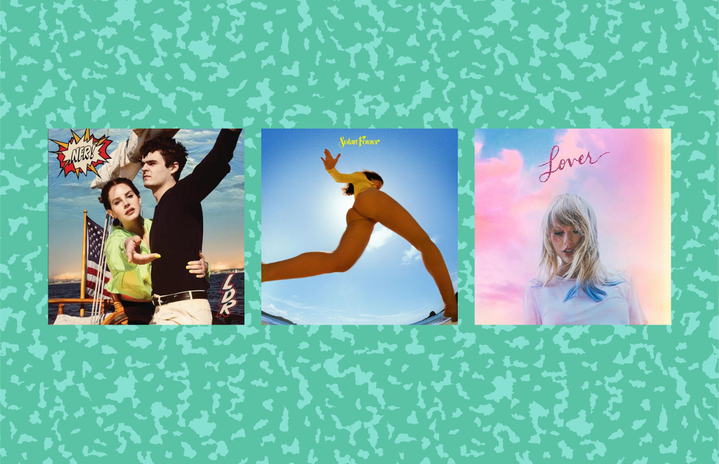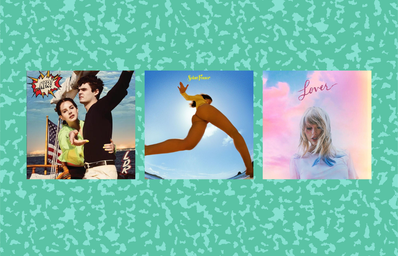Olivia Rodrigo, Taylor Swift, Dua Lipa, Lorde… What do all of these popular female artists have in common (besides their ability to create female empowerment anthems that inevitably turn into billboard hits)? They all have male producers.
Ironic, right? These talented and powerful female artists have become leading role models for so many young girls and women around the globe, and yet there’s a man pulling the strings behind the curtain?
Take Rodrigo, for example: her hit song “drivers license” is all about teenage heartbreak from the raw perspective of a 17-year-old girl, yet is produced by an adult 38-year-old man, Dan Nigro.
Jack Antonoff is another male music producer who has been popping up in the music sphere everywhere recently. The man behind the band Bleachers produces music for some of the best female artists in the industry, including Lana del Rey, Lorde, and Taylor Swift. Most recently, he produced Lorde’s new song “Solar Power.” Antonoff recently spoke with Rolling Stone about his close inner circle of female artists, explaining that he frequently goes to them first with pitches for new music.
Why do female artists like Swift choose to work with male producers like Antonoff, rather than collaborate with women?
In 2017, Antonoff told The Guardian about why he almost exclusively works with female artists, saying, “I’ve always been extremely drawn to female artists who are being brutally honest. That is so much more attractive to me than a lot of the weird paths certain male songwriters lead you down, that hide and mask emotions.”
But why do female artists like Swift choose to work with male producers like Antonoff, rather than collaborate with women?
For instance, Joel Little produced Swift’s outrightly feminist anthem titled “The Man,” with lyrics like “I’m so sick of running as fast as I can / Wondering if I’d get there quicker / If I was a man.” Aaron Dessner produced Swift’s song “Mad Woman,” a so-called sister song to “The Man” that has feminist undertones as well and allegedly calls out Scooter Braun, Swift’s ex-music manager. This isn’t to say that men like Little and Dessner can’t be feminists, but with songs that blatantly discuss the gender inequalities between men and women, wouldn’t you think Swift would want to work with a female producer — someone who actually relates better to the subject matter?
Only 2% of producers in the music industry are female, and women only make up 21% of music artists and 12% of songwriters.
In 2020, Lipa said that she wanted to work with more female producers, but that she hasn’t because… honestly? She doesn’t really know any. Lipa spoke about the widespread discouragement toward women pursuing music and production roles, telling GQ, “There is a massive problem — that maybe starts in schools — in which girls aren’t necessarily encouraged to play more masculine instruments, aren’t really encouraged to go into production, whereas men naturally fall into that path.” She went on to say, “I always feel it’s easier to talk to girls and I’m more open around female energy. Maybe if women in general had a little bit more of that in studios it wouldn’t feel so intimidating to begin with.”
Lipa isn’t wrong. According to a study conducted by the Statista Research Department published in 2021, only 2% of producers in the music industry are female. Moreover, a study on inclusion, gender, and race and ethnicity in the music industry found that women only make up 21% of music artists and 12% of songwriters. The music industry has been heavily dominated by men for so long that it makes it difficult for women to cut through the noise — but more than that, pre-existing stereotypes and the ongoing sexualization of women create deep barriers in the industry. 75 female songwriters and producers reported in the latter study the types of obstacles they commonly face in the industry: 43% reported that their skills are typically discounted or underestimated, and 39% said that they are stereotyped and sexualized. Additionally, 83% of these women stated that they have experienced discomfort in the recording studio, whether that be due to objectification or being the only woman in the room. Even for the women who do make it into the male-dominated industry, it is especially challenging for them to get promoted and to find new opportunities due to these societal and gender-related barricades.
The other frustrating thing about the music industry’s shutout of female producers is that even the existing female producers in the industry go unrecognized and underappreciated for their work. Although women have been nominated at the Grammy’s for producing music, not a single one of them has taken home a gold gramophone trophy since the show began handing out this award in 1975.
Powerful female artists such as Swift and Lorde have the resources and finances to actively seek out the female producers that do exist and magnify their work.
The fact of the matter is that even if Rodrigo, Swift, Lorde, and other female artists were more adamant about working with female producers, there aren’t enough female producers to meet the demand of female artists, or artists of any gender, for that matter. Not only are there not enough women who become music producers, but the ones that do struggle to gain recognition, stay financially stable (since all the available work is being taken by their male counterparts), and navigate the sexist work environment that is the music industry.
Although breaking down sexism in our country is an ongoing battle, there are other measures that can be taken to diversify the music industry when it comes to gender inclusion. Schools and music institutions should aim to lift up women in music and encourage them to pursue their interests and passions, whether these interests are male-dominated or not. Ultimately, careers and passions don’t have a gender. Additionally, in order to give female producers a place at the table, there needs to be a push to halt the amplification of male producers. Powerful female artists such as Swift and Lorde have the resources and finances to actively seek out the female producers that do exist and magnify their work. Although small in number, there are nonetheless some very talented female producers in the industry who are continuing to produce music despite the odds, including Jessy Lanza, TOKiMONSTA, and Crystal Caines, to name a few. Fans can also implore their favorite artists to work with more female producers, and can actively share the work of female producers themselves. If enough fans speak up on the issue, it will inevitably garner the attention of their favorite artists and perhaps lead to positive change.
Honestly, I think Antonoff will be fine if he loses one member of his golden trio.
Studies Referenced:
Smith, Stacy L., et al. (2019). Inclusion in the Recording Studio? Gender and Race/Ethnicity of Artists, Songwriters & Producers across 700 Popular Songs from 2012-2018.
Statista, (2021). Share of producers in the music industry in the United States from 2012 to 2020, by gender.


